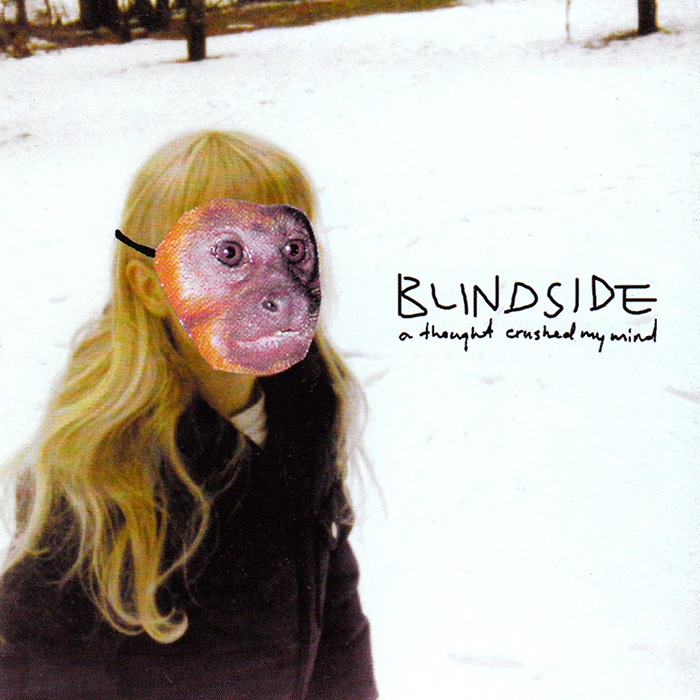Of course, I do that and I've long since opened the previously unopened titles appearing in those stacks and created an entirely new stack over the last week or so through thrifty poking about here and there, but for today let's take a closer look at the top of that first stack. I talked previously about how I find music, but this will address the details that lead to my often seemingly arbitrary decisions by looking at why it is this band or that album warranted enough interest to take up more of my rapidly diminishing space.

The top of the stack bears the split release from Agoraphobic Nosebleed (who I've never really listened to) and Converge (whose albums I've purchased most of), titled The Poacher Diaries. It was first dropped on on Hydra Head, who've born artists like, well, Converge, Piebald, Neurosis, Pelican, Botch (more on them later), Coalesce, Torche and Harvey Milk. This, however, is the 2006 remaster that was put out by Relapse Records, who carry a variety of heavy artists and have always done so. Some they've even shared with Hydra Head like Converge and Coalesce, though they tend more consistently toward the even heavier end of things, also carrying bands like Pig Destroyer, with the odd exception for bands that have changes from the heavier end of the spectrum like Baroness (more on them as well!). Converge was the draw for me, of course, as they are one of the most respected of the modern "metalcore" or "metal/hardcore" or whatever the hell (especially at that intersection, it becomes confusing!) bands around, considered consistent and experimental simultaneously. Though, to be honest, it was simultaneously the album art for their (currently, another is set to be released in a month and a half) last album as well as the lead track, "Dark Horse," which has a magnificiently blistering lead guitar lick:
Below that, we have Alien's The Pleasures of Leisure, which is a relatively obscure electronic album, as these things go. It's in the vein of a lot of the electronic music I already listen to, in the Squarepusher/µ-Ziq/Aphex Twin range of things, though more on the pleasant beat-oriented side, and not off into the weirder jazz-y experimentation of Jenkinson (Squarepusher) or the extreme strangeness of James (Aphex) when he gets bored. It has a whopping two reviews on Amazon, both of which are five stars and highly complimentary. Between those elements, the fact that I kept seeing it at FYEs in their label dumps, I decided I'd suck it up and just buy the damn thing for $1.50, so I did.
Baroness released Yellow & Green as a follow up to their first two records, Red Album and Blue Record, continuing a theme I imagine everyone has readily grasped, as it's a lot less subtle than Morbid Angel's alphabetical albums, or XTC's "album titles use a lyric from the previous album" that began as an accident. In any case, this album (these albums?) have received some criticism, as seems inevitable, for their increased "softness." This is a cardinal sin for many metalheads, and Baroness were distinctly metal on their first two records. I looked into them as an opening act for what would have been my third Mastodon show if I had made it to the second one I was planning to attend (I didn't--though I reaped the fantastic band Kylesa from that non-attendance, too), which means that, if nothing else, Mastodon can be trusted for opening acts, it seems. Kylesa, Baroness, Priestess--bands I've come to pay enough attention to I almost forget I discovered them as "just" opening acts. However, let it be noted that there's nothing wrong with this (these) Baroness album(s). Yes, they are quieter, but with songs like "Take My Bones Away," you'll have no trouble recognizing Baroness made the album, even if the style does change from what they've been known for throughout most of the work.
When I saw Friday Night Is Killing Me by Bash & Pop on the shelf at one of my regular haunts, I thought, "Now why does that name--" Bash & Pop "--sound so familiar?" I might have just flipped the album over and gotten my answer, but I quickly googled it on my phone and immediately removed the disc from the shelf without hearing even a bit of it. Bash & Pop was Replacement bassist Tommy Stinson's first post-'Mats music. That was enough. I've come to love all of the 'Mats work together, and everything Westerberg has released outside the group, so it seemed safe to assume that Tommy wouldn't let me down either. I've already passed around the iffy-quality video of him and band performing "Fast and Hard" on Letterman 20 years ago, but it bears repeating:
I've seen Boysetsfire releases hanging around a lot over the years, but the typography of their logo--not kidding--never encouraged me to look into them. It looked like the wave of almost-heavy music that America has spawned in the wake of the increasing acceptance of heavy music in general, which often fails to hit that right bone of fist-pumping energy that heavy music so often inspires in me, so I usually leave it by the way-side--it's also often less complicated music in the American realm of things, with simplistic riff-orientation that usually doesn't feel inferior, per se, so much as not engaging to me personally. Well, this little EP, Live for Today was $.25 and I quickly wiki'd the band to find out what genre they were associated with and saw "post-hardcore," which sealed the deal at $.25. It could have been terrible, but I figured I'd chance it at that price. It's worth noting, I suppose, that some time ago I'd picked up a split from Coalesce and Boysetsfire on the basis of Coalesce's reputation more than anything else. I remembered one side impressed me more but honestly couldn't remember which it was--likely Boysetsfire's, in all honesty, as Coalesce uses the weird mutant-burp voice I associate with bands like Atreyu and Thursday, which I've never found myself able to get used to, or prevalent enough to encourage me to change that stance (though I always think about it just a bit, knowing how vocal tolerance has been beneficial before). I mentioned an increased stack of music--well, a lot of it is actually Boysetsfire material, so you can guess how this turned out.
Botch is a name that has slid past my eyes on numerous occasions, usually as I'm trying to find more post-hardcore bands, or one I already listen to--and sometimes bands I listen to from other genres--mentions them as an influence. I heard it enough that I finally figured I ought to check into the band directly and this was the first release I ever saw. While the cover of An Anthology of Dead Ends doesn't lend itself to the idea, this is indeed one of the albums I mentioned when I said I've been listening to music that made adjacent cars roll their windows up. Botch is in the somewhat dissonant and atonal range of "mathcore" and hardcore, the kind of band that lets their feedback ride or even builds it up in intros and outros, longer than you normally expect a band to let it go. Not unusually for this set of subgenres, they also have a weird approach to things, with a clear slice of humour injected that's enough to be obvious but not distracting. The titles of the songs on this EP are all names of countries with "n" replaced by "m" like "Spaim" or "Micaragua," with nothing else seeming to tie them together. It's interesting music, though, and not just in a "distant museum curiosity" sort of way: the strange, pinched high-end, off-kilter intro leads to thudding hardcore that eventually spirals off into other areas over buzzing bass--really the kind of thing that makes you think of mathcore, to be fair--especially when the time signature and tempo changes start. But it all somehow feels natural all the same--the mark of quality experimental natures, if you ask me.
And, yes, that was an alphabet failure.
There has been nothing to declare heavy music as a current intentional outlet, but I did manage to cram an awful lot of it in above. I've been pursuing Bronski Beat with some insistence after stumbling around through various associations over the years. My father listened to them, and I recalled them as just being obnoxiously falsetto (then again, I had bad memories of Nick Lowe's A Party of One, and now own that and many of his other albums) until somewhere or other a site referencing gay anthems--I cannot recall for the life of me how I got there--mentioned "Smalltown Boy," and I thought, "Well, maybe I should see what this band sounds like to me now," and gave it a listen. Instantly familiar, vaguely nostalgic and quite catchy, I decided that this was worth pursuing further. I eventually picked up the album it came from, Age of Consent, on vinyl, but kept an eye out for a CD for car-based listening. I saw one shortly after learning it was to be reissued and skipped it. I found later that there were some 12" mixes on this earlier release and went back for it (having found it, somewhat bizarrely, in the "Dance/Electronic" section of the store I saw it at--which made sense on one hand, but not on others as the meaning of the genre name has changed over the years). I did, however, find this follow-up, the post-Somerville Bronski Beat, which no longer had falsetto vocals, in fact, having moved on to new vocalist John "Jon Jon" Foster. "Hit that Perfect Beat" is a pretty great single that opens the album, though it is still quite distinctly different in tone from the work Larry Steinbachek and Steve Bronski did with Jimmy Somerville two years earlier.
One of the most bizarre things I ever saw was the set of somewhat-negative reviews of these albums on Amazon. They all basically said the same things: "I really liked these albums until I realized that I did because they just sound like a continuation of Jawbox." I was reminded of someone who said they liked Aphex Twin until they found out he just spews out music in seconds. Why on earth would either of these things be bad? If you're a fan of Jawbox and it sounds like a new Jawbox album...why the hell is that cause for complaint? If you like the album, even, and it's not "pale imitation of" or "shadow of," but literally sounds like a continuation, that's the best thing in the world. But, then, I think I've established that a lot of these kinds of thought processes make no sense to me.
Technicaly, I'm still missing Turn! Turn! Turn! (I'm not sure, but I think it might be Columbia attempting to shift the Byrds catalog purely into the "Complete Columbia Albums" collection they released) as well as the Untitled album, but this was still to round off my rapidly growing Byrds collection with the material that was recorded as they moved into becoming The Byrds "proper." There are David Crosby solo demos mixed with all the work the band was doing under the name "The Jet Set" at World Pacific Studios. Yeah, it's a curiosity thing, one of those "only for devotees" releases, but that makes it fascinating to me--especially with a nice, extensive booklet like this one has in its full version, as released here by Sundazed, which takes the "album" Preflyte and turns it into The Preflyte Sessions to compile all the tracks recorded--including the two released as an actual 7".











No comments:
Post a Comment